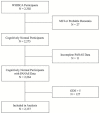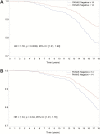Negative Affect Is Associated With Higher Risk of Incident Cognitive Impairment in Nondepressed Postmenopausal Women
- PMID: 29028908
- PMCID: PMC5861908
- DOI: 10.1093/gerona/glx175
Negative Affect Is Associated With Higher Risk of Incident Cognitive Impairment in Nondepressed Postmenopausal Women
Abstract
Background: Positive affect (PA) and negative affect (NA) reflect subjective emotional experiences. Although related to depression and anxiety, these dimensions are distinct constructs representing affective states and patterns. Prior studies suggest that elevated depressive symptoms are associated with risk of mild cognitive impairment (MCI) and probable dementia, but whether affective states are associated with cognitive impairment is still unknown. The present study examined relationships between baseline affective states and cognitive impairment (MCI, probable dementia) in nondepressed women.
Method: Baseline PA and NA were assessed in postmenopausal women (N = 2,137; mean age = 73.8 years) from the Women's Health Initiative Study of Cognitive Aging (WHISCA) using the Positive and Negative Affect Schedule (PANAS). Women were followed annually for an average of 11.3 years; those with elevated depressive symptoms at baseline were excluded.
Results: Higher NA was associated with a higher risk of MCI and probable dementia, even after adjusting for important covariates including age, education, sociodemographic, lifestyle, and cardiovascular risk factors, global cognition, and hormone therapy assignment at baseline. PA was not significantly associated with either outcome.
Conclusions: We present the first evidence to date that greater NA, even in the absence of elevated depressive symptoms, is associated with higher risk of MCI and dementia. This suggests that NA may be an important, measureable and potentially modifiable risk factor for age-related cognitive decline.
Figures


Similar articles
-
Depressive symptoms and incidence of mild cognitive impairment and probable dementia in elderly women: the Women's Health Initiative Memory Study.J Am Geriatr Soc. 2011 Jan;59(1):57-66. doi: 10.1111/j.1532-5415.2010.03233.x. J Am Geriatr Soc. 2011. PMID: 21226676 Free PMC article.
-
Comorbid Mild Cognitive Impairment and Depressive Symptoms Predict Future Dementia in Community Older Adults: A 24-Month Follow-Up Longitudinal Study.J Alzheimers Dis. 2016 Oct 18;54(4):1473-1482. doi: 10.3233/JAD-160244. J Alzheimers Dis. 2016. PMID: 27589518
-
The relationship between depressive symptoms and subtypes of mild cognitive impairment in post-menopausal women: Results from the Women's Health Initiative Memory Study.Int J Geriatr Psychiatry. 2022 Nov;37(11):10.1002/gps.5817. doi: 10.1002/gps.5817. Int J Geriatr Psychiatry. 2022. PMID: 36205005 Free PMC article.
-
Depression as a risk factor for dementia and mild cognitive impairment: a meta-analysis of longitudinal studies.Int J Geriatr Psychiatry. 2013 May;28(5):441-9. doi: 10.1002/gps.3845. Epub 2012 Jul 19. Int J Geriatr Psychiatry. 2013. Retraction in: Int J Geriatr Psychiatry. 2015 Apr;30(4):435. doi: 10.1002/gps.4279. PMID: 22815126 Retracted. Review.
-
Prevention of cognitive impairment in the midlife women.J Menopausal Med. 2015 Apr;21(1):19-23. doi: 10.6118/jmm.2015.21.1.19. Epub 2015 Apr 27. J Menopausal Med. 2015. PMID: 26046033 Free PMC article. Review.
Cited by
-
Midlife Psychological Well-Being and its Impact on Cognitive Functioning Later in Life: An Observational Study Using a Female British Birth Cohort.J Alzheimers Dis. 2019;72(3):835-843. doi: 10.3233/JAD-190590. J Alzheimers Dis. 2019. PMID: 31640097 Free PMC article.
-
Quality of life, religion/spirituality, and dementia risk among Black people in the US.Aging Ment Health. 2025 Jun;29(6):1072-1080. doi: 10.1080/13607863.2024.2430534. Epub 2024 Nov 26. Aging Ment Health. 2025. PMID: 39589019
-
Well-Being as a Protective Factor Against Cognitive Decline and Dementia: A Review of the Literature and Directions for Future Research.J Gerontol B Psychol Sci Soc Sci. 2023 May 11;78(5):765-776. doi: 10.1093/geronb/gbad020. J Gerontol B Psychol Sci Soc Sci. 2023. PMID: 36734357 Free PMC article. Review.
-
Psychological characteristics and functional abilities in older adults with subjective cognitive complaints: A potential new target for early intervention.Int Psychogeriatr. 2025 Mar 24:100066. doi: 10.1016/j.inpsyc.2025.100066. Online ahead of print. Int Psychogeriatr. 2025. PMID: 40133135
-
Correlations between Dementia and Loneliness.Int J Mol Sci. 2023 Dec 24;25(1):271. doi: 10.3390/ijms25010271. Int J Mol Sci. 2023. PMID: 38203442 Free PMC article. Review.
References
-
- Watson D, Clark LA. Negative affectivity: the disposition to experience aversive emotional states. Psychol Bull. 1984;96:465–490. - PubMed
-
- Watson D, Clark LA, Tellegen A. Development and validation of brief measures of positive and negative affect: the PANAS scales. J Pers Soc Psychol. 1988;54:1063–1070. - PubMed
-
- Joiner TE Jr, Lonigan CJ. Tripartite model of depression and anxiety in youth psychiatric inpatients: relations with diagnostic status and future symptoms. J Clin Child Psychol. 2000;29:372–382. doi:10.1207/S15374424JCCP2903_8 - PubMed
-
- Goveas JS, Espeland MA, Woods NF, Wassertheil-Smoller S, Kotchen JM. Depressive symptoms and incidence of mild cognitive impairment and probable dementia in elderly women: the Women’s Health Initiative Memory Study. J Am Geriatr Soc. 2011;59:57–66. doi:10.1111/j.1532-5415.2010.03233.x - PMC - PubMed
Publication types
MeSH terms
LinkOut - more resources
Full Text Sources
Other Literature Sources
Medical

